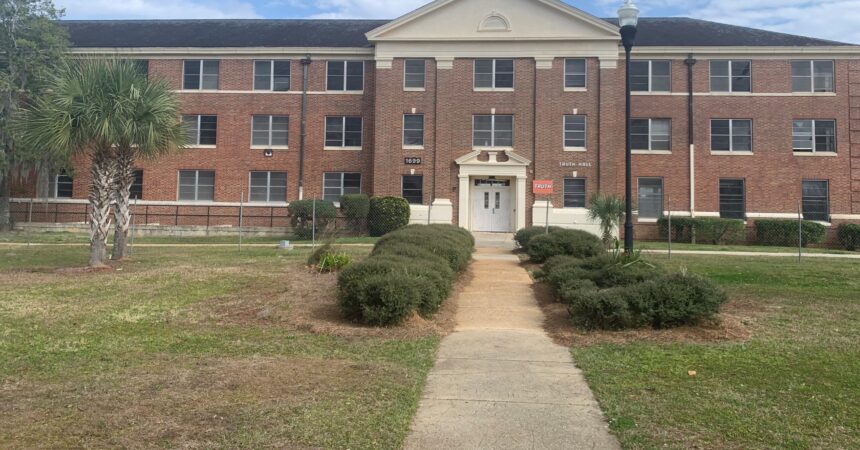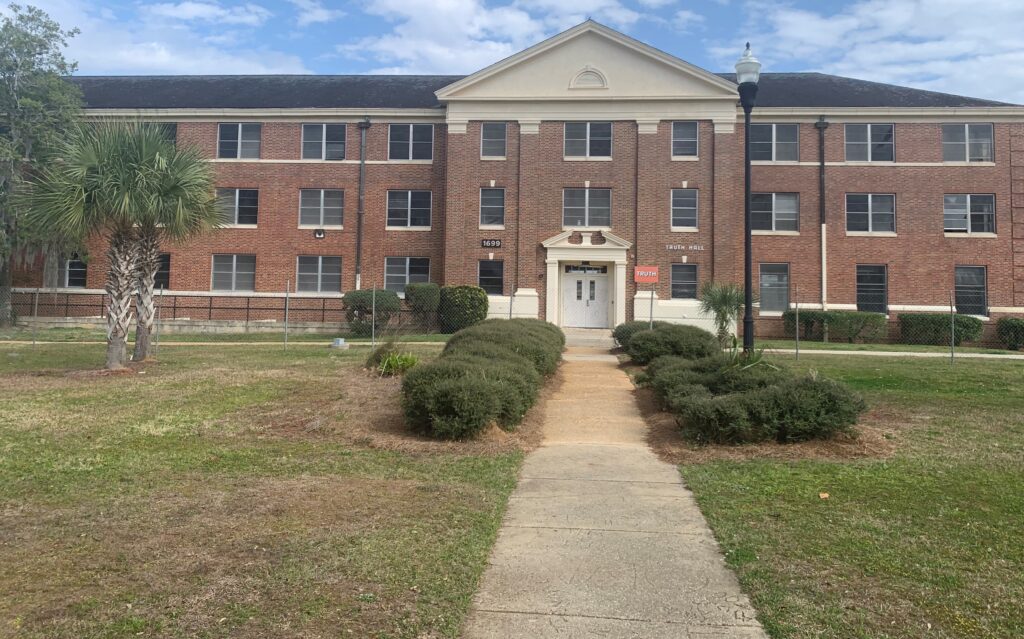
Plans to demolish Truth Hall spur ire, memories

Photo by Charlesalyn Preston
By Charlesalyn Preston
Outlook Writer
Last summer when FAMU began to tear down the last building in the Paddyfote Housing Complex, the demolition caused quite an outcry with mixed reactions.
There has been more of the same since the university announced it will demolish 64-year-old Truth Hall to create more green space. Five other former resident halls that many consider to be iconic on the campus of the HBCU have been taken down in recent years.
Opposition to the destruction of Truth Hall, however, has gone as far as the Leon County Circuit Court. Delaitre Hollinger, president of the National Association for the Preservation of African American History and Culture, said his appeal to the court is in an effort to save history.
Plans to take down the four-story building that once housed just over 100 students are expected to be completed by May, according to the university.
In an open letter that sent to the parties named in his suit, Hollinger bemoaned destruction of yet another historic building on FAMU’s campus. He called for the university to save the building for its historic value.
“The demolition of National Register-listed properties, such as McGuinn Hall, Diamond Hall, Cropper Hall and Wheatley Hall, was alarming to many alumni and university stakeholders,” Hollinger wrote. “Such is the demolition of Truth Hall, which though not listed as a contributing property in the National Historic District, continues the trajectory of tearing down the campus’s historic buildings for “greenspace.”
Hollinger said he filed the suit on Feb. 21 after sending emails to FAMU President Larry Robinson, William Hudson, Vice President of Student Affairs, the Board of Trustees and the Board of Governors. He said he also asked that the building be saved during an in-person appearance at a recent BOT meeting.
“No one ever returned my emails,” Hollinger said. “No one ever reached back out to me.
“It was clear and apparent that the university had planned to move forward with the demolition.”
Hudson responded to the Outlook’s request for comments on the demolition, saying he couldn’t discuss it because of the suit.
However, he told the Tallahassee Democrat that demolition of Truth Hall has to be taken down so that FAMU could receive funding for the FAMU Towers, which opened last year. The cost of renovating the old structure was compared to building a new, Hudson said in his interview with the Democrat.
Truth Hall, named for Black civil rights activist Sojourner Truth, was built in 1958 as housing for female upper-class students. The 32,000-square-foot building was renovated in 1988 and at the time it houses 106 students. It was shuttered as a dormitory in October 2020.
Since then, the building has shown signs of deterioration. Water has penetrated the exterior walls, windows are corroded, and there is clogged drainage in the basement windows.
News of Truth Hall being torn down drew swift reaction from former students who lived in Truth Hall.
Melanie R. Newman lived in the coveted quad rooms on the first floor during her sophomore during the late 1990s.
“I am happy to see the school modernizing housing and the campus,” she said. “That’s what kids want to see when they are deciding between FAMU and Duke, Yale (and) USC. I think we have to have updated facilities.
“History is important, but student recruitment is also important. I am sad to see the dorm complexes that I ran all the way through being torn down, but my memories and pictures are still with me. I never expected that my children would stay in those same dorms. I commend the school for staying focused on the future.”
Like Hollinger, some students would like to see the dorm renovated. Cassandra Bess, another former Truth Hall resident, was simply torn.
“It’s a bittersweet feeling,” she said. “I feel like they shouldn’t tear it down because it’s a monumental building. Instead, they should remodel it to meet today’s modern living standards if possible.”
Bess recalled how she was disappointed about not being able to live on campus. After she was able to afford on-campus housing, she formed a sisterhood with other Truth Hall residents.
“We were a community of women that empowered and prided themselves in engaging programs to bring a sense of community within our small community,” she said. “Overall the experience was very inviting. I never felt alone living there. We always had something to do.”







